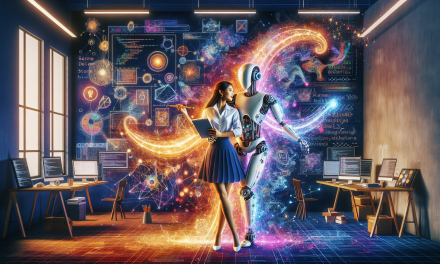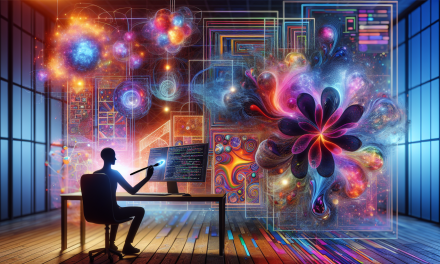Standing in a dimly lit theater, a magician reveals the secret behind their most dazzling illusion. The audience gasps—not in disappointment, but in wonder. They’re seeing something even more impressive than the original trick: the ingenious method behind the magic. This moment of revelation doesn’t diminish the art; it transforms spectators into potential practitioners, each one now carrying a spark of possibility.
The same phenomenon happens when a skilled programmer opens their code to the world. Lines of logic that seemed mysterious suddenly become delightful puzzles to solve. What looked like digital wizardry transforms into teachable moments. Far from protecting their secrets, the most accomplished magicians and coders share them freely—and in doing so, they create something far more valuable than any individual trick or program.
The Magic of Making Magic
Think about how magic actually works. A magician spends months perfecting a single illusion, learning every gesture, timing every pause. They could guard that secret jealously, performing it exclusively for paying audiences. Instead, many choose to teach. They write books, create videos, and mentor apprentices. They understand something counterintuitive: sharing a secret doesn’t reduce its power—it multiplies it.
When Penn & Teller explain how they make an elephant disappear on stage, they’re not ruining the magic. They’re revealing something even more fascinating: the layers of psychology, engineering, and showmanship that create wonder. The trick becomes a doorway into a whole world of creative problem-solving.
This generous spirit flows through the magic community like an underground river. Magicians gather at conventions not just to perform, but to teach and learn from each other. They swap techniques, share improvements, and collectively push their art forward. A newcomer might learn a basic card force from a master performer, then years later develop that technique into something completely original.
The Open Source Spell
In the coding world, this spirit of sharing has a name: open source. When programmers release their code publicly, they’re performing their own version of “the reveal.” Instead of hoarding their digital creations, they invite the entire world to peek behind the curtain, learn how things work, and build something even better.
Consider how many of the tools we use daily emerged from this philosophy. The web browser you’re using likely contains open source components. Your smartphone runs on systems built with publicly shared code. The very infrastructure of the internet depends on protocols and programs that anyone can examine, modify, and improve.
But here’s what makes this truly magical: when programmers share their work, they don’t lose ownership of it. Instead, they gain something more valuable—a community of collaborators, testers, and fellow creators. A simple photo-editing script shared by one person might inspire a thousand variations, improvements, and entirely new applications.
The Python programming language exemplifies this beautifully. Created by one person but shaped by millions, it’s become a tool so versatile that scientists use it to discover new planets while children use it to create their first games. Every time someone contributes to Python, they’re not just adding features—they’re expanding possibilities for everyone who comes after.
From Student to Sorcerer
Both magic and coding share a beautiful lifecycle of learning. Today’s wide-eyed beginner becomes tomorrow’s generous teacher. A child who learns their first card trick from a YouTube video might grow up to create thousands of new tutorials. A student who downloads their first open source program might eventually contribute to projects used by millions.
This cycle creates something economists call “network effects”—each new participant makes the entire system more valuable for everyone. When a magician teaches someone to palm a coin, they’re not creating competition; they’re expanding the universe of wonder. When a programmer mentors someone through their first code contribution, they’re not training a replacement; they’re multiplying the community’s creative capacity.
The most successful practitioners in both fields understand this instinctively. They build reputation not by hoarding knowledge, but by sharing it generously. A magician known for teaching becomes more sought-after, not less. A programmer who contributes to open source projects builds a portfolio that speaks louder than any resume.
The Innovation Paradox
Here’s where things get really interesting: sharing secrets doesn’t slow innovation—it accelerates it. When magicians openly discuss techniques, they don’t run out of new ideas. Instead, they create pressure to keep innovating. If everyone knows how to make a coin vanish, you need to figure out how to make it reappear inside a sealed lemon. If your card trick is common knowledge, you develop one that seems to read minds.
Programming follows the same pattern. When basic sorting algorithms became public knowledge, programmers invented more efficient ones. When simple encryption methods were openly analyzed and broken, cryptographers developed stronger systems. Each revelation creates space for the next breakthrough.
This happens because creativity isn’t a finite resource that gets depleted when shared. It’s more like a fire that spreads from person to person, growing brighter with each exchange. A shared technique becomes raw material for new innovations. A published method becomes a stepping stone to discoveries nobody has imagined yet.
Building Tomorrow’s Creators
Perhaps most importantly, this culture of sharing creates pathways for newcomers to join the community. When a nine-year-old watches a magic tutorial online, they’re not just learning a trick—they’re discovering that they, too, can create wonder. When a teenager downloads their first programming language, they’re not just getting a tool—they’re receiving an invitation to help build the digital future.
The best teachers in both fields understand that their role extends beyond transferring knowledge. They’re cultivating curiosity, building confidence, and nurturing the next generation of creators. A magic teacher who patiently explains the mechanics of misdirection is developing future innovators. A coding mentor who walks someone through their first programming loop is expanding the community’s creative potential.
This teaching mindset transforms both fields from exclusive crafts into inclusive communities. When secrets become stepping stones rather than barriers, everyone benefits. The art forms grow richer, the problems get solved faster, and the sense of shared discovery makes the journey more meaningful for everyone involved.
The Real Magic
So what’s the deeper secret that both magicians and coders understand? The most powerful tricks and elegant code aren’t ends in themselves—they’re conversations. They’re ways of saying, “Look what’s possible!” and “You could do this too!” They’re invitations to join a community of creators who understand that the real magic isn’t in keeping secrets, but in sharing them wisely.
Every time someone explains how a program works or demonstrates the method behind a mystifying effect, they’re performing an act of generosity that ripples forward through time. Today’s explanation becomes tomorrow’s innovation. Today’s student becomes next year’s teacher. The cycle continues, and with each turn, the community of creators grows stronger and more inventive.
Whether you’re learning to code your first program or practicing your first card trick, remember that you’re joining a tradition of generous sharing. The people who came before you freely offered their knowledge not because they had to, but because they understood something wonderful: the best way to multiply magic is to give it away.








